Published Sep 1, 2022
What Raffi Musiker Taught Me About Traumatic Grief
How Star Trek: Picard helped one fan understand her own loss.
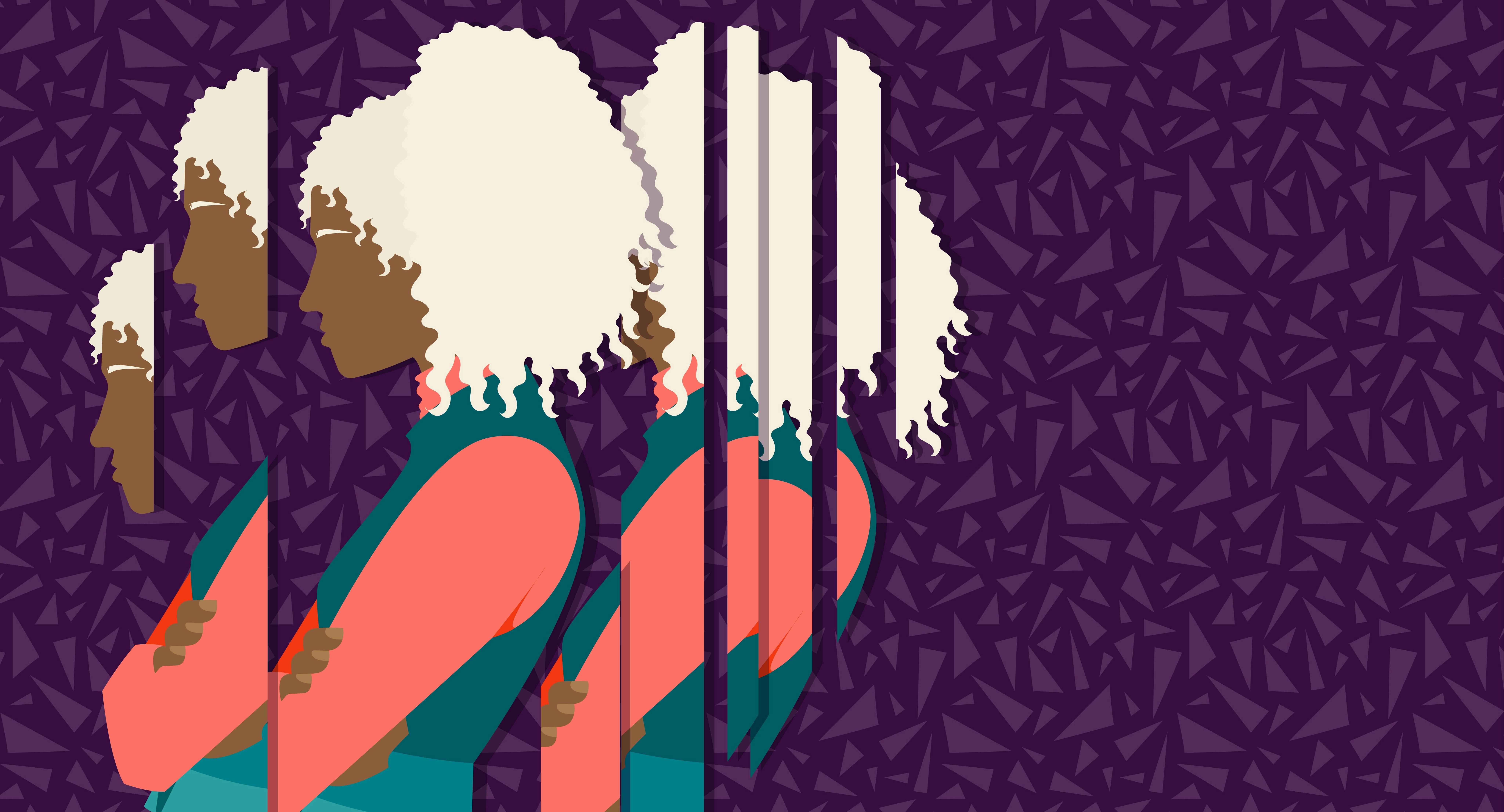
StarTrek.com
Loss is something that most people will experience at some point in their life. But, like most things, not all bereavement experiences are the same — when loss is accompanied by traumatic circumstances, such as a sudden or untimely death, it can lead to a type of grief known as traumatic grief. What characterizes the experience of traumatic grief is often its intrusive, intense, and complicated grieving process, which can last for months or years after the fact.
Among other tragedies, the COVID pandemic alone has led to a sweeping number of traumatic and often isolating losses, leaving behind many people who may experience this traumatic grieving process. Although traumatic grief isn’t a unique experience, the fact remains that the journey can still be extremely isolating, especially for women of colour like myself. When I experienced a traumatic loss, I was encouraged to grieve in private, and to keep my turbulent, messy emotions within myself – otherwise, I’d risk being seen as “immature” or “burdensome” among my social circle. These expectations extended within my culture as a whole — if there were people out there who grieved like I did, they were expected to keep it in the dark much like I was. For a long time, I believed that my experiences were an anomaly, and that I was at fault for reacting so strongly to this specific loss.
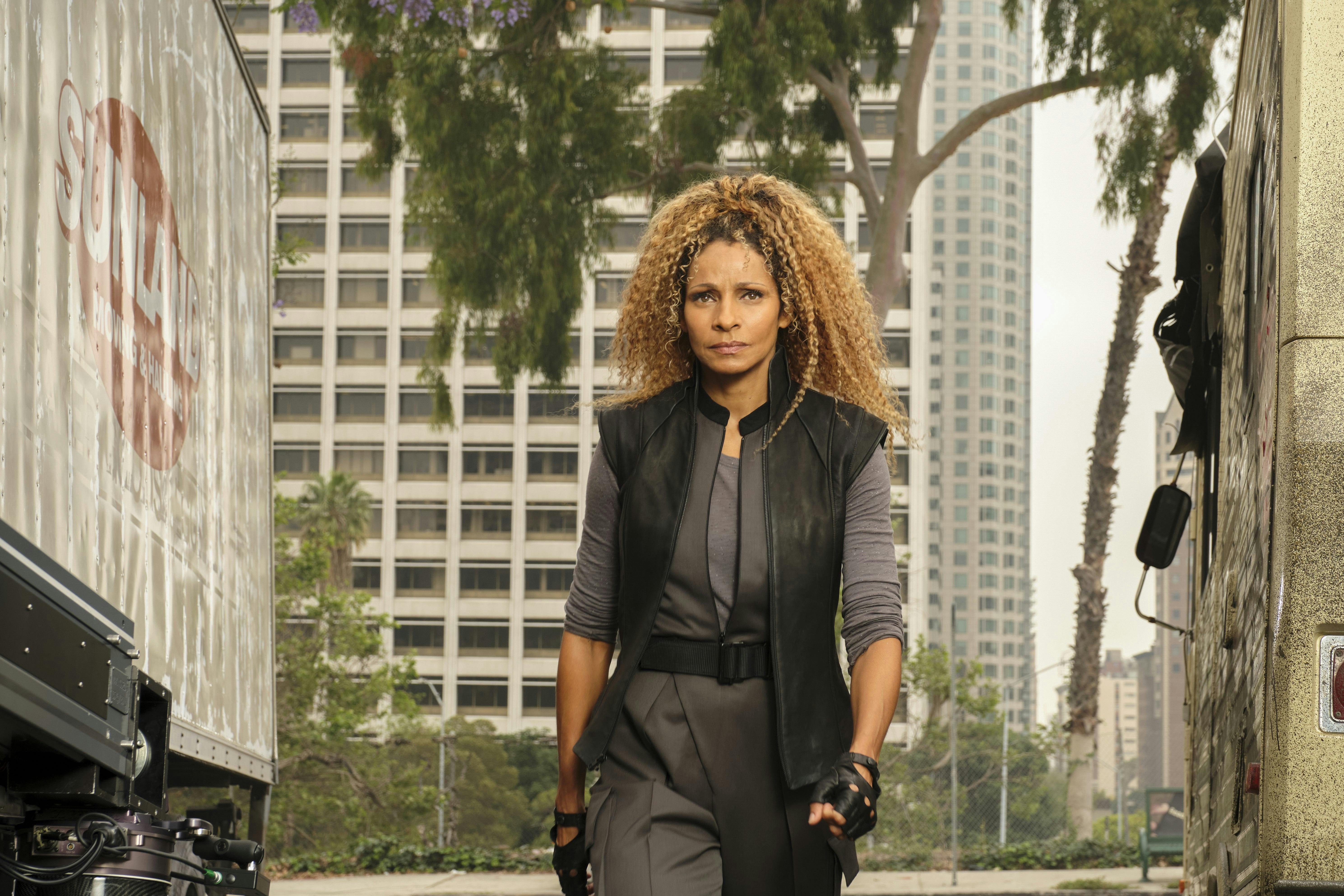
StarTrek.com
Which was why, when I followed Raffi Musiker’s journey in Season 2 of Star Trek: Picard, I was struck by how candid and relatable her story was to me. For the first time, I saw exactly what I had gone through on-screen — and how to make sense of it and heal from it.
In the episode “Assimilation,” Raffi witnesses the death of Elnor as the La Sirena travels back in time to 2024. The circumstances that surround this loss are similar to that of a traumatic loss — Elnor’s death is violent, untimely, and arguably preventable, had the power on the ship been diverted to Sickbay to save Elnor’s life instead of being used to preserve the Borg Queen. Raffi is left feeling that she is responsible for his death, and that she could have done more to save him. The loss of Elnor himself is also especially painful for Raffi, as the two had developed a close mentor-mentee relationship over the course of the series. His death, in a way, mirrors the loss of the relationship with her son Gabe in “Stardust City Rag,” reopening familiar wounds for her. (This is later alluded to by her partner Seven of Nine in “Fly Me to the Moon.”) All this compounds her grief into something more complicated and traumatic than the proverbial “normal” grieving process that the rest of the La Sirena crew go through.
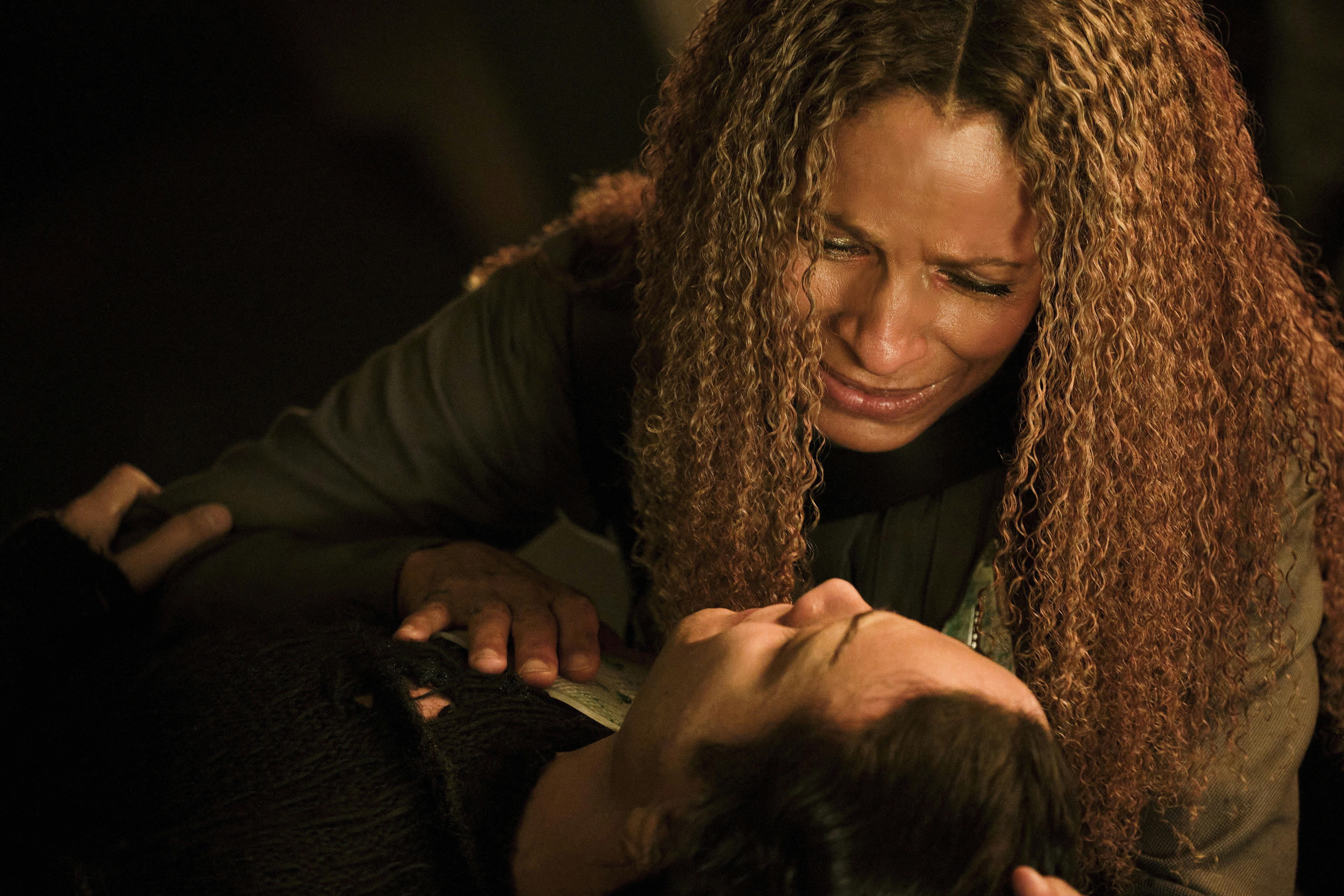
StarTrek.com
Raffi reacts to her loss in many different ways. In the direct aftermath of Elnor’s death, she expresses her grief in motion. She immediately sets her focus on the mission at hand and is acutely efficient at making progress towards fixing the timeline — she identifies the Watcher as their lead and their target to follow, finds the optimal location to beam into within Los Angeles, and adapts their technology for use in the 21st Century. She refuses to slow down, brushing off Seven’s attempts to help her process her loss, “What I want is to [...] fix the timeline, and not talk about how it felt to watch him die.”
Her urgency to press on and work towards concrete goals instead of pausing to process the full pain of the loss was something that was familiar to me. Often, women of colour are judged harshly for any displays of emotionality in the aftermath of trauma, and their competence and ability can be called into question as a result. Even within the show, Picard notes that Raffi is “too emotional” and declares that “too much can go wrong” if she is allowed to continue. It’s a statement that can arguably be taken as dismissive of Raffi’s inner strength, given the circumstances she’s in. In my experience, women of colour often place higher expectations on themselves to remain diligent and separated from their emotions in the aftermath of traumatic loss. We set concrete, if lofty, goals for ourselves in hopes of somehow making up to those we have lost. In the same way, Raffi sets her priorities on the impossible — finding the Watcher and fixing the timeline — in hopes of bringing Elnor back.

StarTrek.com
By not allowing herself the space to process her grief, it inadvertently crops up in different ways — all of which are notable reactions to traumatic loss in particular. On a physical level, we see Raffi struggling with sensory overload in the Bus Punk scene in “Watcher.” Loud noises are overwhelming for her and she’s physically distressed by it, fidgeting with her necklace and turning her head away from the noise, until Seven steps in and asks him to turn his music down. Raffi also experiences visual hallucinations of Elnor after his death, thinking that he was present on two separate occasions in “Watcher” and “Two of One.” Raffi’s experience shows that intense grief can manifest on a physical level as well as the emotional — something that is often overlooked when understanding the symptoms of grief.
Emotionally, we see Raffi being prone to impulsiveness in “Watcher,” where she decides to steal a cop car and chooses to use a phaser to speed things along, despite obvious risks. Seven tries to reason with her and slow her down, noting that “[Raffi’s] brains are in [her] fists.” She makes a similar observation in “Fly Me to the Moon,” where she calls out Raffi for being “too careless,” and that, in the aftermath of loss, Raffi wanted to “find a target,” “set [her] feet and fight.” In a way, Seven is right. Much of Raffi’s grief manifests in the “fight” part of the “fight, flight, or freeze'' reaction in the aftermath of trauma. Without an appropriate space to process loss, Raffi’s grief comes through in her desperate need to achieve something and gain control over a situation, whether that be finding Rios, fixing the timeline, or both.
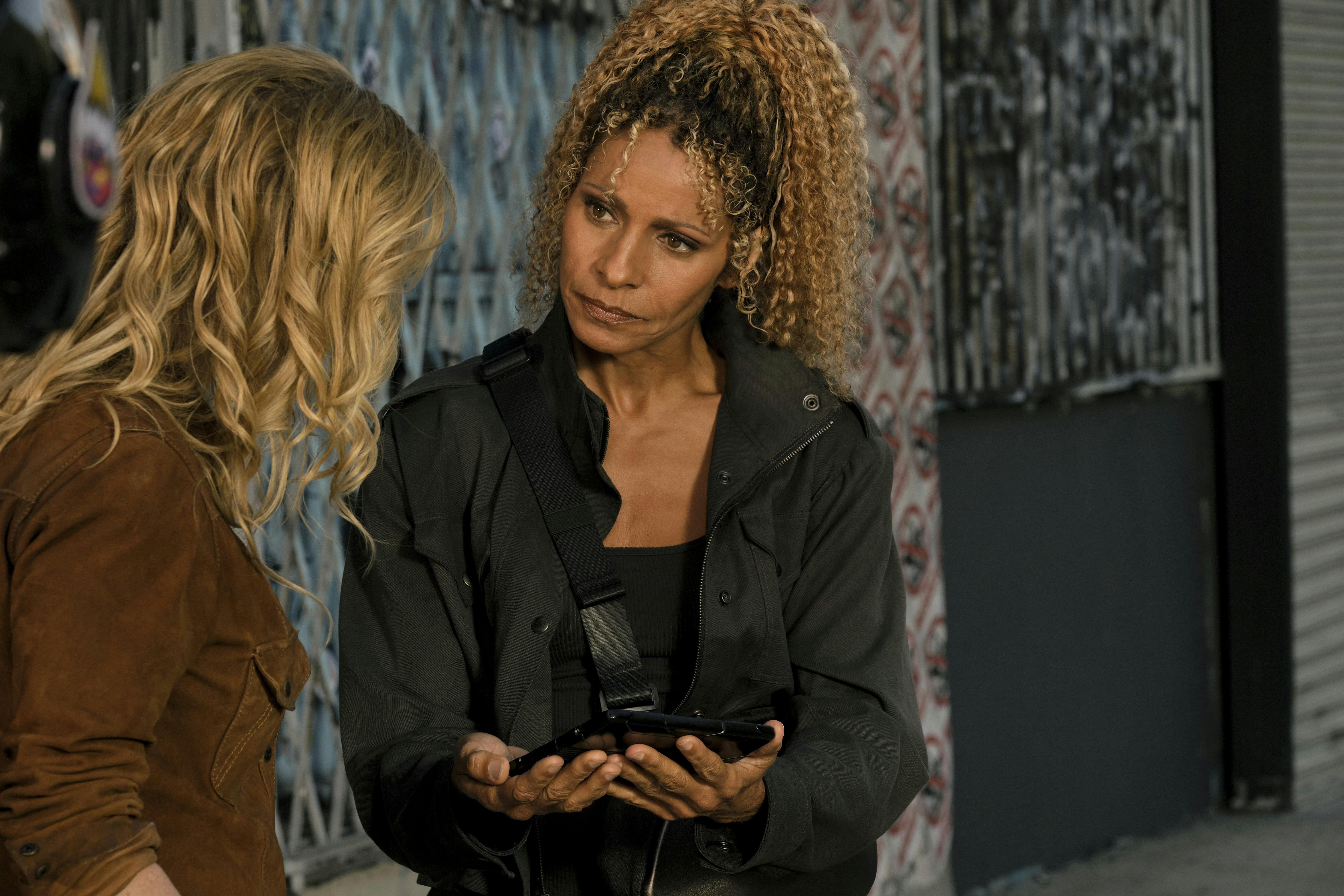
StarTrek.com
But experiencing grief is half the story. How we live with it – and are supported through it – is what makes the difference.
Throughout Raffi’s journey, the person who most closely supports her is her partner Seven of Nine. Seven clearly knows Raffi well and draws a wonderful balance between actively supporting Raffi, and giving her the space to grieve and recover on her terms. There is much we can learn from in how they navigate Raffi’s grief as a couple, and how we can, in turn, support our loved ones who are going through similar losses.

StarTrek.com
Most notably, Seven tries to slow Raffi down to process her loss, even in the middle of the chaos they have to go through. She acknowledges that Raffi had lost someone openly and directly, and offers herself as someone who Raffi can talk to about it. When Raffi rejects her attempts for the first time in “Assimilation,” Seven doesn’t drop the topic entirely – she waits until Raffi is ready to try and discuss this again in “Watcher.” Likewise, timing can make the difference when supporting a loved one who is grieving. Just because they aren’t ready to talk about it in the first instance doesn’t mean that they wouldn’t be in the future. Eventually, Raffi finds the right moment in “Mercy” to open up about how she had convinced Elnor to stay at the Academy for her selfish reasons, and the unresolved guilt she feels towards him as a result. Different people have different paces in opening up about bereavement — as women of colour, it can take us longer to start talking about our losses out of a need to appear strong, resilient, and competent in the immediate aftermath. Nevertheless, being able to speak about the deceased to someone we love and trust can be very important for those who go through traumatic losses. Though it may take time, being able to eventually start a conversation can be integral in helping us process our loss and find closure through telling our story.
One of Seven’s hallmark skills throughout her history in Trek is her ability to adapt to different social situations. Likewise, she’s able to observe Raffi’s emotional state and adapt accordingly to support Raffi in different ways. She notices that Raffi is overwhelmed by loud music in “Watcher” and asks the bus punk to turn down his music for her. She identifies when Raffi is agitated while in the LAPD and quickly leads her away from the situation, allowing her to calm down. In “Fly Me to the Moon,” Raffi mistakes a young man for Elnor and is momentarily emotional because of it. Seven notices a shift in her mood and her first response is to affirm Raffi — “I’ve got your back, you’ve got mine, right?” — as a way of grounding her and comforting her. Throughout these instances, Seven keeps a watchful eye on Raffi, but ultimately respects her independence and her resolve — she doesn’t sideline Raffi from the mission at hand in an attempt to shield her. Instead, her actions empower Raffi to continue working on the mission while being able to eventually process her emotions in a healthy way. Seven’s approach strikes a good balance between being accommodating towards Raffi’s emotional needs while recognizing, and more importantly trusting, that she’s able to contribute to the mission as well as anyone else.
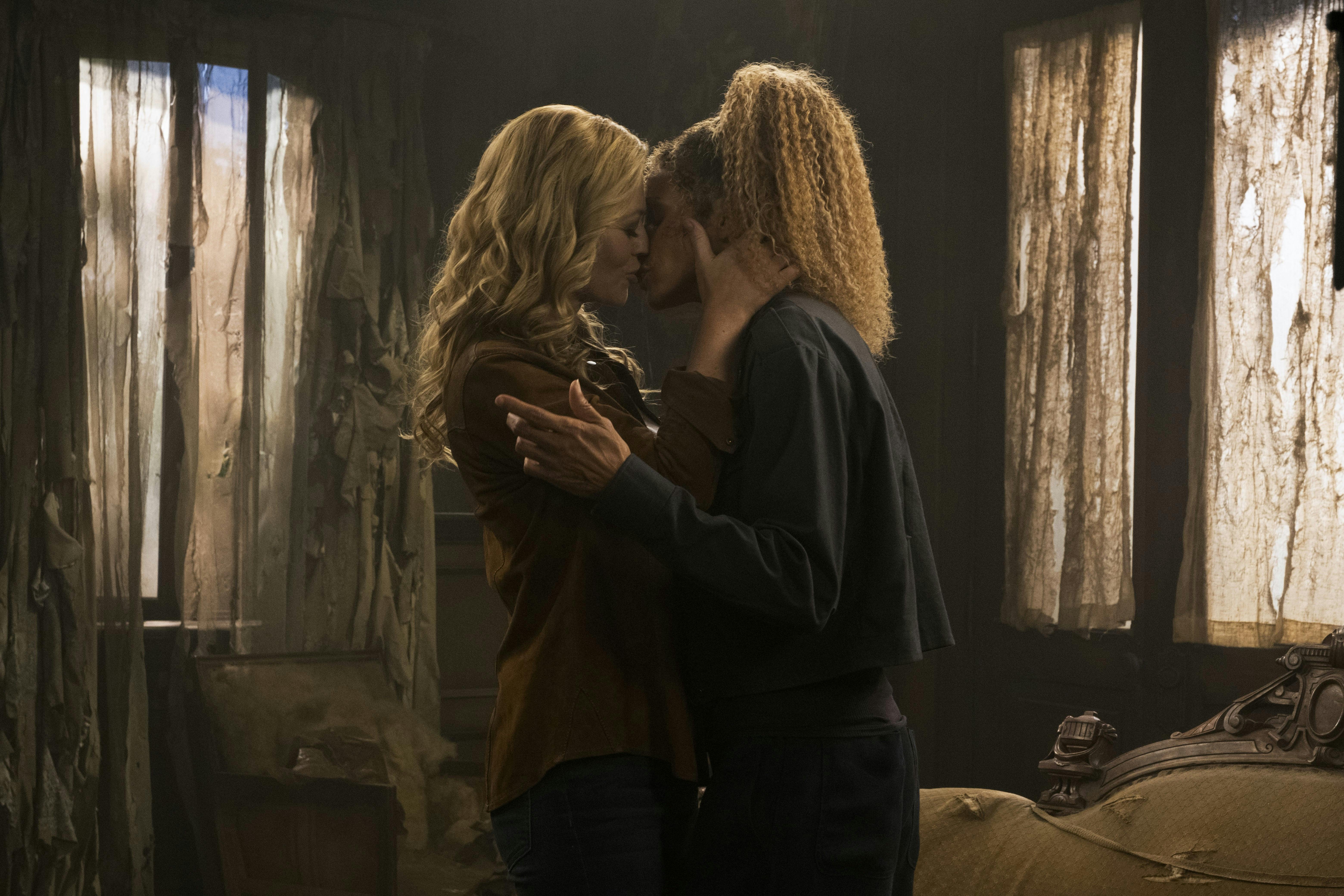
StarTrek.com
Though there is no one-size-fits-all solution to supporting a loved one through grief, what Seven and Raffi have done extremely well throughout the season is to be ever accommodating and open with each other. Seven’s awareness of Raffi as an individual has allowed her to support her in a way that best suits Raffi — in this instance, Seven knows to give Raffi the time and space she needs to come to terms with the loss on her own. Eventually, Raffi opens up to Seven, knowing that it will help her in her own acceptance of the loss. Watching Seven be there for Raffi every step of the way reminds us that, despite how isolating grief can be, we are surrounded by people who care for us. Though it can be harder for some people than others to share their experience, ultimately, being able to find community in the aftermath of loss can be the first step in healing from it.
What Raffi went through this season has helped me understand much of my own grief and make sense of it in a way I hadn’t been able to before. The fact that this is the story of a queer woman of colour, no less, at a time when women of colour are expected to unemotionally persevere through their adversity, is something that means all the more to someone like me. To see that Raffi is allowed to keep going, being neither sidelined nor judged for her emotions, has taught me that my value is not lessened just because I’m struggling with grief. Michelle Hurd certainly deserves all the praise for her candid and heartfelt portrayal of Raffi’s emotional journey over the course of the season. Raffi is perfectly imperfect in her grief, and sometimes that’s who we need to be to really process our loss. Raffi has shown me that I’m not alone in my grief, and that I’m not at fault for it – loss can happen to anyone and draw up any number of emotional reactions. What’s important in the aftermath isn’t to expect perfection, but to live on in my own “Raffi” way — to allow yourself to process the pain, anger and hurt, and to allow yourself the time and space to heal — however long it may take.

StarTrek.com
Olga Kwan (she/they) is a freelance writer and full-time geek based in the UK. You can find her on Twitter @olgakwants.
Star Trek: Picard streams exclusively on Paramount+ in the U.S. and is distributed concurrently by Paramount Global Distribution Group on Amazon Prime Video in more than 200 countries and territories. In Canada, it airs on Bell Media’s CTV Sci-Fi Channel and streams on Crave.
Stay tuned to StarTrek.com for more details! And be sure to follow @StarTrek on Facebook, Twitter, and Instagram.

